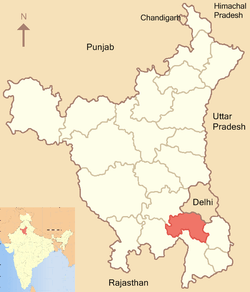Dundahera
| Dundahera | |
|---|---|
| city | |
 Dundahera | |
| Coordinates: 28°30′46″N 77°04′41″E / 28.51276°N 77.07805°ECoordinates: 28°30′46″N 77°04′41″E / 28.51276°N 77.07805°E | |
| Country | India |
| State | Haryana |
| District | Gurgaon |
| Population (2001) | |
| • Total | 10,640 |
| Languages | |
| • Official | Hindi |
| Time zone | IST (UTC+5:30) |
Dundahera is a census town in Gurgaon district in the state of Haryana, India. It lies near to Udhyog vihar the industrial area adjacent to Delhi border and is dominated by Yadavs.[1][2] It has a population of about 12220 persons living in around 2739 households.[3]
Demographics
As of 2001 India census,[4] Dundahera had a population of 10,640. Males constitute 59% of the population and females 41%. Dundahera has an average literacy rate of 76%, higher than the national average of 59.5%: male literacy is 83% and, female literacy is 66%. In Dundahera, 12% of the population is under 6 years of age. The village forms largest chunk of municipal Ward No. 3 of Municipal Corporation of Gurgaon. The present Municipal Councillor from this ward is Mrs. Monika Yadav who got elected after the electoral process held in April–May, 2011 for the first ever elections of Municipal Corporation of Gurgaon.
Culture
Dundahera, being located on the Delhi-Haryana border, neighboring one of the earliest developed industrial areas has witnessed a sea change in the prevailing culture. Migrant laborers and workers employed by the industries surrounding the village had no other housing alternative than to look for cheap accommodation provided by the local people of Dundahera. Majority of the original native inhabitants of this village have left their ancestral homes to live in the urban sectors and they have rented out their homes to the laborers /lower working class thereby providing affordable accommodation to a large workforce; something which indeed was the duty of government policymakers or industrialists. The village has become a mixture of cultures as migrant labourers from all over India; mostly from eastern Indian states, nestle there for many years and their population has outnumbered the local population in terms of headcount. The village has lost all its ponds, green-belts, villagers' common places to the encroachment, acute commercialization and official apathy.
See also
All villager and happy in living there but new generation are not good settled there they shifted near HUDA sectors in nearby village
References
- ↑ http://wikimapia.org/1767728/Dundahera-Village
- ↑ http://books.google.co.in/books?ei=L7KeTbS3MJHQrQe0sfSFAw&ct=result&id=DMMxAQAAIAAJ&dq=yadavs+of+dundahera&q=yadavs
- ↑ http://www.geolysis.com/place-info.php?p=615000454&k=134279277
- ↑ "Census of India 2001: Data from the 2001 Census, including cities, villages and towns (Provisional)". Census Commission of India. Archived from the original on 2004-06-16. Retrieved 2008-11-01.
| ||||||||||||||||
